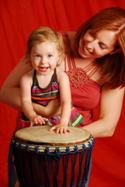“Babies Are Born to Dance, New Research Shows” is the headline of a recent report in Science Daily: “Researchers have discovered that infants respond to the rhythm and tempo of music and find it more engaging than speech.”
 Data like this connect with key issues about mind-body integration. Music seems to be central to every major human capacity — emotion, thought, memory, and physical movement.
Data like this connect with key issues about mind-body integration. Music seems to be central to every major human capacity — emotion, thought, memory, and physical movement.
* Music and emotion: Music seemingly automatically generates emotional responses.
* Music and thought: We often grope for thoughts and images to capture what music means, and music combined with lyrics intensifies the experience of both.
* Music and memory: We learn and love the ABC song as kids, and the song makes it easy for us to learn and memorize 26 symbols in the proper order. Or: If you were asked to memorize the list of ingredients in the McDonald’s Big Mac, it might be a chore. But put the list to music and it’s easy and fun to memorize, and we remember it with nostalgic pleasure years later. (Or maybe that’s just me.)
* Music and kinetics: Music naturally makes us want to move over bodies — from finger-tapping to head-bobbing to all-out dancing.
All of that has implications for education: If music is so central, so powerful, and so much fun, can we better use music across the curriculum to teach children?
 The connection between music and movement reminds me of John Locke’s Some Thoughts concerning Education and the striking fact that he mentions dancing first when outlining his curricular choices. (Here is my discussion of John Locke on education.)
The connection between music and movement reminds me of John Locke’s Some Thoughts concerning Education and the striking fact that he mentions dancing first when outlining his curricular choices. (Here is my discussion of John Locke on education.)